
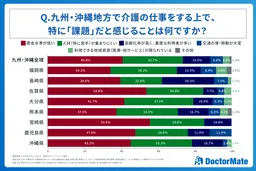
Surprising Satisfaction Among Care Workers in Kyushu and Okinawa Amid Future Fears
Unexpected Job Satisfaction Among Care Workers in Kyushu and Okinawa
A recently conducted survey by Dr. Mate Inc, a company providing medical solutions for caregiving institutions, uncovered surprising results about the career satisfaction levels of care workers in the Kyushu and Okinawa regions.
Overview of the Study
The study surveyed 441 individuals with experience working in elder care facilities across Kyushu and Okinawa, including nursing homes and home-care services. Conducted online from June 4 to June 11, 2025, the survey focused on several key topics to gauge the sentiments of these workers amidst ongoing challenges in the caregiving industry.
Job Satisfaction Is Higher Than Expected
Contrary to what many might assume, the survey indicated that a significant number of participants were satisfied with their jobs. In Okinawa, over 50% of respondents expressed positive feelings about their work in elder care. In regions like Kagoshima and Okinawa, where responses indicated satisfaction, nearly half or more reported being satisfied or somewhat satisfied with their roles. However, the mood shifts in other areas—such as Nagasaki and Saga, where more than 80% of respondents provided negative feedback when including neutral responses.
Positive Outlook for Job Continuity in Three Years
Regarding the continuity of their careers over the next three years, many in Okinawa, Miyazaki, and Fukuoka expressed a favorable outlook. The highest commitment to staying in their positions for another three years came from Okinawa at 45.2%, followed closely by Miyazaki at 40.7% and Fukuoka at 38.7%—all above the overall average. On the contrary, respondents in Kagoshima (42.9%), Kumamoto (37.5%), and Oita (31.3%) showed more hesitation about their future in this field.
Low Wages Remain the Top Challenge
Overall, the most pressing challenge faced by care workers is low wages, with many participants pointing to this as a significant issue. In Saga, over 50% of workers brought attention to wage concerns. Yet, Fukuoka highlighted a different concern—difficulty in attracting talent, marking it as their top issue, further emphasizing the geographical disparity in challenges faced by care workers. Meanwhile, Nagasaki respondents noted the high aging rates and increased needs among heavier-utilization patients as prominent difficulties they confront in their roles.
Fear for the Future of Care Provision
Perhaps most strikingly, 80% of survey respondents expressed a lack of confidence regarding the sustainability of the caregiving system over the next five years. When combined, those who were either unsure or doubtful about future provisions were substantial. Conversely, regions like Oita and Okinawa saw relatively higher affirmation rates concerning the sustainability of the care system.
Insight from Dr. Naoki Aoyagi, CEO of Dr. Mate
In response to these findings, Dr. Naoki Aoyagi, CEO of Dr. Mate, articulated the compelling need to heed the voices from the caregiving front lines. He remarked on the stark contrast between this survey in Kyushu and previous studies in Tohoku, suggesting that varying socio-economic, geographical conditions, operational policies of care facilities, and community engagement might play roles in the satisfaction and retention of care staff. He acknowledged that while concerns for the future loom large, prioritizing solutions that resonate within the community remains pivotal.
About Dr. Mate Inc.
Founded in December 2017, Dr. Mate Inc. offers services tailored for care facilities, alleviating labor burdens through daytime medical consultations and night call handling. As of now, they have expanded their impact, serving over 1200 elder care facilities nationwide, helping address chronic workforce shortages. Looking ahead, Dr. Mate aims to continue investigating needs within the caregiving sector, advocating for systemic change, and developing supportive initiatives for care workers across the regions.
Conclusion
The survey results reflect a unique perspective on the caregiving profession in Kyushu and Okinawa. While satisfaction and desire to remain in the field are strong, the overarching concerns about future sustainability signal an urgent need for strategic reforms and community-driven solutions in the essential sector of elder care.
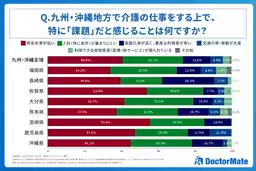
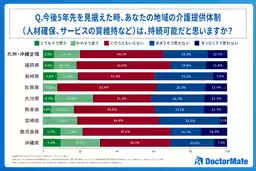
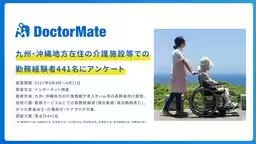
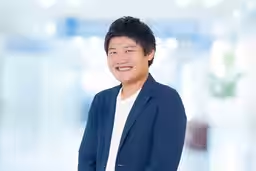
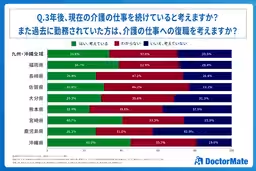
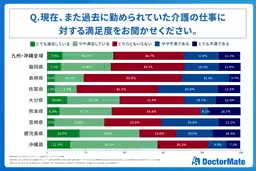
Topics Health)










【About Using Articles】
You can freely use the title and article content by linking to the page where the article is posted.
※ Images cannot be used.
【About Links】
Links are free to use.